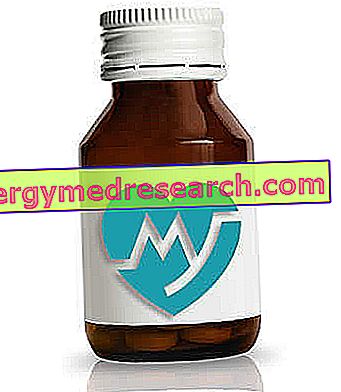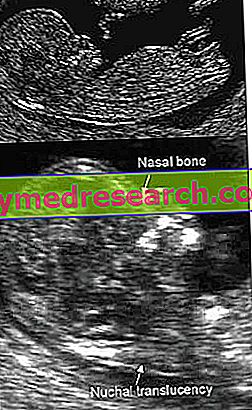Definition
In the medical field, the term "gout" refers to a metabolic disorder in which there is a pathological accumulation of urate crystals (uric acid and urates) in the blood and in the joints; gout, in addition to creating a deposit of uric acid in the various anatomical sites and in the serum (hyperuricemia), can degenerate into renal pathologies and into inflammatory attacks affecting the limbs.
Causes
Gout is the result of a reduction in renal excretion of urates (given by a deficiency of renal function), associated with an excessive synthesis of purines (nitrogen compounds constituting the DNA), a condition - the latter - closely linked to the rich diet of animal proteins, and heavily influenced by genetic predisposition. Gout affects almost exclusively men and the most vulnerable groups are the elderly.
Purine catabolism → ico uric acid in plasma → gout
Symptoms
Gout is often accompanied by painful symptoms, characterized by kidney stones and joint pain, and associated with a more or less significant alteration of body temperature. The most affected joints are definitely the toes, ankles, knee, wrist, elbow, etc. The typical joint pain of gout is often abrupt and violent, and is accompanied by swelling and erythema.
Natural Care
Diet and Nutrition
Information on Gout - Drugs for the Treatment of Gout is not intended to replace the direct relationship between health professional and patient. Always consult your doctor and / or specialist before taking Gotta - Medicines for Gout Care.
drugs
Fortunately, gout can be cured: we are not talking about an incurable disease, as it could have been in the past; the drugs, in this case, represent the preferred therapies for the treatment of gout, which, when well cared for, tends to disappear in 5-10 days.
It is understandable, however, that gout should not be underestimated: in fact, an incomplete or scarce pharmacological treatment can exacerbate the disease, which can degenerate into serious complications, such as urinary stones and very painful deposits of urates in cartilages and tendons (or tophi) .
In general, the treatment for gout initially involves the monitoring and control of the primary symptoms (acute phase), subsequently, the therapy should be based on the perspective of preventing acute episodes, controlling the levels of uricemia. To give an example, in the event of acute monoarticular arthritis, anti-inflammatory and painkiller drugs should be administered after immobilizing the painful limb.
For the treatment of the primary symptoms associated with gout, NSAIDs and colchicine are used, while for prophylactic treatment, aimed therefore at preventing complications and possible relapses, the most widely used drugs are allopurinol and sulfinpyrazone.
NSAIDs : non-steroidal anti-inflammatory drugs are widely used to treat the symptoms of the acute phase of gout. Do not take uricosuric drugs in the acute phase, as they may paradoxically prolong the disease and hinder healing: these drugs must be taken in the prevention of gout, after acute treatment.
- Diclofenac (eg. Fastum Painkiller, Dicloreum): take 50 mg of drug orally 3 times a day (tablets); in some patients an initial dose of 100 mg is required, and then changed to 50 mg. After the first day, the total daily dose should not exceed 150 mg.
- Ketoprofen (eg. Fastum, Ketoprofen ALM, Steofen): for the treatment of the acute phase of gout, it is recommended to take 100 mg of the drug the first time, and then continue with 50 mg of active every 6 hours, until the moment in which the acute attack vanishes. In general, the pain tends to fade in 2-3 days.
- Naproxen (eg. Naprosyn, Prexan, Naprius): indicatively, to reduce the symptoms related to gout, take 150-200 mg of drug per day, fractionated in several doses.
- Piroxicam (eg Feldene, Piroxicam EG, Artroxicam): start therapy with 40 mg of active; always continue with 40 mg per day (single or fractionated dose in 4-6 doses) until the symptoms are remitted.
Do not take acetylsalicylic acid.
Antigotta agents :
- Colchicine (eg. Colchicine LIRCA, Colchicine FN): it is a toxic alkaloid with antimitotic action, useful to favor the elimination of uric acid; the efficacy of this drug is comparable to that of NSAIDs (analgesic and anti-inflammatory). Colchicine is preferable to NSAIDs for cardiac patients, as it does not generate water retention. Colchicine should be taken at a dose of 500 mcg every 4 hours, until the prodrome is reduced. Do not exceed 6 mg per cycle. Also useful for relapse prevention: the maintenance dose is 1 mg per day.
- Allopurinol (eg. Zyloric, Allurit, Allopurinol FN): the drug (xanthine oxidase inhibitor) is another anti-gout agent; it acts by inhibiting the synthesis of uric acid. It must not be taken in the acute phase; in fact, the intake of this drug is exclusively aimed at preventing the synthesis of uric acid starting from the purines (indicatively: 2-3 weeks after the treatment for the acute phase of gout). The administration of this drug should be continued for an indefinite time, established by the doctor on the basis of the severity of the disease and on the response of the patient. Initially take 100 mg per day of medication after the meal; subsequently, the dose should be adjusted based on the plasma concentration levels of uric acid. For mild forms of gout, the maintenance dose is 100-200 mg of drug per day; this increases up to 300-600 mg / day in the medium forms and 700 mg / day for the severe ones. In case of renal insufficiency, the dosage must be reduced.
- Febuxostat (Adenuric): available in tablets of 80 and 120 mg, the drug - able to reduce the synthesis of uric acid - is indicated to monitor the levels of uric acid in the blood (treatment of long-term hyperuricemia). Indicatively, the recommended dose is 80 mg a day. Consult your doctor.
- Probenecid (eg Probenec FN): belonging to the class of uricosuric drugs; exerts a good therapeutic activity favoring the elimination of uric acid. Initially take 250 mg of drug per os every 12 hours for 7 days. The maintenance dosage is 500 mg per os every 12 hours. The dose can be changed by the doctor based on the levels of uric acid in the blood.
- Sulfinpyrazone (eg Enturen): this drug also belongs to the uricosuric class, and is therefore useful for promoting the elimination of uric acid. It is generally used as a substitute for allopurinol and in case of relapses of gout particularly difficult to treat. It is recommended to start therapy with 100-200 mg of substance per day on a full stomach. Change the dose every 2-3 weeks: 600-800 mg per day. Also in this case, the dosage should be modulated on the basis of blood tests, observing the uricemia.
Note : it is recommended to avoid taking certain drugs such as diuretics, cortisone drugs, salicylates (aspirin), which can potentially exacerbate the problem.
Furthermore, in case of proven gout, it is good to follow a diet low in animal proteins and alcohol, and if necessary to decrease body weight (follow a hypocaloric diet).
Finally, to avoid the degeneration of gout in kidney stones, a conspicuous intake of liquids is essential, associated with the conspicuous intake of alkalizing foods (fresh fruit and vegetables in general); citrus fruits are particularly recommended.



